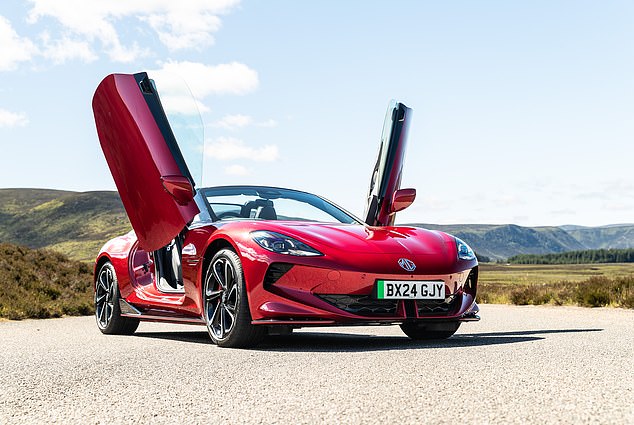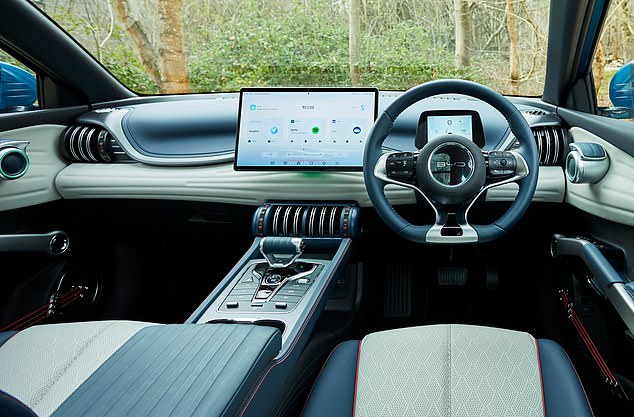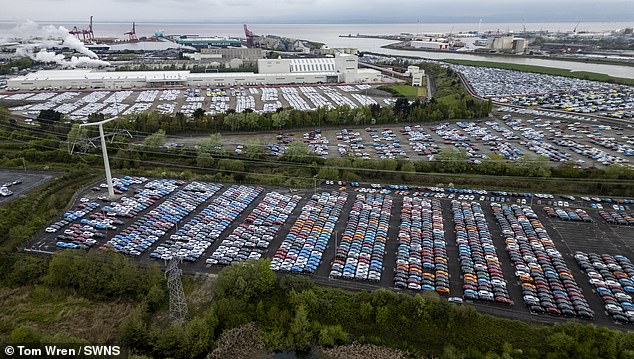China’s share of the UK car market has increased tenfold in two years amid fears Beijing’s electric vehicles could be ‘weaponized’ to spy on Britons
The Chinese share of the British car market has increased tenfold within two years, MailOnline announces.
Nearly 10.3 percent of imported cars are now produced in Chinese factories – up from just under 1 percent in 2022, government data shows.
Only Germany now exports more to Britain than China.
These include thousands funneled through BYD, which is flooding forecourts with ultra-cheap electric motors amid the huge push to phase out petrol and diesel engines.
Fellow Chinese brands MG and Great Wall Motors have also tapped into demand for eco-friendly cars, driven by Beijing’s desire to dominate the multibillion-dollar market.
Rising sales from China have fueled fears that Britain could become dependent on a malign state, with senior MPs expressing concern that electric vehicles brought in will be ‘weaponized’ to gather intelligence.
As Chinese companies like BYD dramatically scale up production, factories across the country are also producing major Western brands.
Tesla’s ‘Gigafactory’ in Shanghai can produce more than 1 million vehicles per year.
The Shanghai Automotive Industrial Corporation (SAIC) owns the British heritage brand MG and also works with major European manufacturers including Volkswagen and Audi.
The MG Cyberster is the world’s first electric convertible. Built by the Shanghai Automobile Industrial Corporation, it will go on sale soon with a list price of between £50,000 and £60,000, depending on options

The roadster also features exotic ‘scissor style’ doors, first seen on the Lamborghini Countach, designed by Gandini
Mercedes-Benz has a deal with the Geely Holding Group to produce electric cars under the Smart brand.
Germany exported £11.6 billion worth of cars to Britain in the first eight months of 2024, according to figures from the Office for National Statistics.
China ranks second, ahead of rivals in Spain, France, Belgium and South Korea.
Before Covid, the value of Chinese car imports into Britain was less than £400 million annually.
This year, ONS figures show that Chinese imports were worth £2.7 billion between January and August.
Separate data from the Society of Motor Manufacturers and Traders (SMMT) shows the extent of China’s aggressive electric vehicle strategy.
According to the SMMT, BYD sold 445 cars between January and September 2023, compared to 5,260 in the first nine months of 2024 – an increase of 1,082 percent.
The company, best known for its battery technology, only started making cars in 2003. The company now boasts the ‘world’s first position’ in the electric vehicle market.
GWM Ora saw their turnover increase from 668 to 1,076 in the same period.
Between January and June 2024, Tesla remained the best-selling electric car manufacturer in Britain with a 13.8 percent market share, followed by BMW (11.3%), Audi (7%), Mercedes-Benz (6.5 %) and then MG (6.2%).
Last year, China overtook Japan as the world’s largest exporter of cars.
Part of the massive growth was buying older brands like MG. The historic brand, founded by William Morris in 1924, was acquired by SAIC in 2007.
They acknowledge in their annual report that they will ‘use the 100th anniversary of the MG brand as an opportunity to launch new products’.
This includes plans to “accelerate the adoption of new technologies such as AI Foundation Models in vehicles.”
MG’s Cyberster, the world’s first electric convertible, is expected to sell for between £50,000 and £60,000 when it hits UK showrooms in the new year.
The increase comes amid fears that Beijing could hijack the eco-friendly engines to spy on the British.

Security experts fear highly advanced Chinese cars could be used to spy on Britain, gathering intelligence as they drive around the country and sending real-time information back to Beijing.
Professor Jim Saker, chairman of the Institute of the Motor Industry, warned MPs in August 2023 that ‘connected vehicles sweeping the country could be the most effective Trojan horse the Chinese establishment has’.
IMI has been working with the National Protective Security Authority (NPSA) – part of MI5 – on the threat posed by ultra-modern cars.
said Professor Saker hackers can turn off the engine of a “connected car,” a car that has a constant internet connection to update its software and provide location data, or unlock the vehicle remotely and make it easier to steal.
He said: ‘Hackers can disrupt car controls such as the horn, wipers, indicators or even headlights, which can lead to safety issues.’
Ex-MI6 chief Sir Richard Dearlove earlier this year urged the government to consider banning Chinese vehicles fitted with advanced technology that could send vital data back to China.
Sir Richard claimed the issue of Chinese cars could be the ‘next Huawei’, following a decision to block the telecoms giant from supplying the infrastructure for the UK’s 5G mobile phone network over fears spies could intercept communications.
US President Joe Biden’s administration has proposed banning “Chinese connected car technology” over security fears.
The White House is also concerned about the subsidies Chinese automakers receive, which they say undermine American manufacturers.
It angered Beijing by slapping a 100 percent tariff on Chinese electric cars.

MG chartered the car carrier Wisdom Ace to transport 4,694 electric vehicles from Shanghai to Bristol – the largest ever delivery of cars to the port in April 2024
EU officials have also expressed concern about the amount of subsidies the Beijing government is offering to Chinese manufacturers.
The European Commission has voted to impose tariffs on Chinese electric vehicles – despite the objections of Germany and Hungary.
The new duties could be introduced by the end of the month if a new trade deal cannot be reached between Beijing and Brussels. The ratesif implemented, British consumers will not be affected by Brexit.
China called them ‘unfair’.
The duties will apply to all cars produced in China, even those from European or American brands such as Polestar, Volvo, VW, BMW and Tesla.
Some links in this article may be affiliate links. If you click on it, we may earn a small commission. That helps us fund This Is Money and keep it free to use. We do not write articles to promote products. We do not allow a commercial relationship to compromise our editorial independence.
